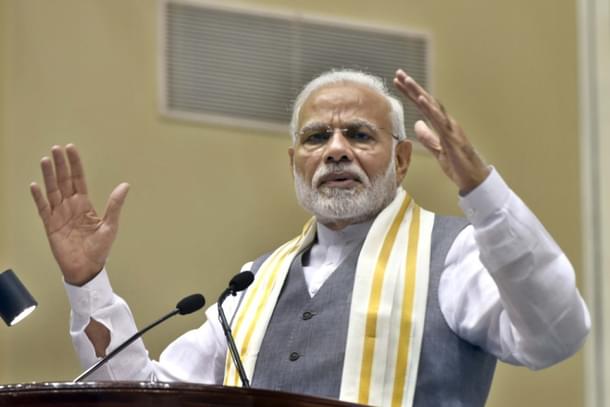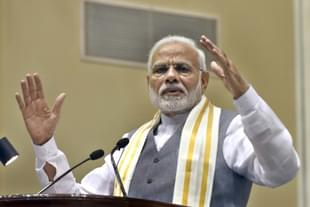Politics
Why This Election Is Looking Like Modi Versus Nothing
Shwetank Bhushan Singh
Mar 24, 2019, 01:36 PM | Updated 01:36 PM IST
Save & read from anywhere!
Bookmark stories for easy access on any device or the Swarajya app.


With the announcement of election dates, now the battle for 2019 Lok Sabha elections has indeed begun.
These are early days, but the consensus of most political observers is that the battle increasingly looks fierce and promising, where each vote will count. Various pre-poll surveys and trackers subtly indicate leads for the Bharatiya Janata Party (BJP), projecting that the party will get the maximum number of seats. But just like 2014, all are shying away from giving the National Democratic Alliance alliance a clear majority.
However, the ground assessment of the Hindi heartland clearly indicates that with Prime Minister Narendra Modi's popularity, strengthened by Amit Shah's voter matrix and an array of fragmented ‘gathbandhans’ on the other side, the writing is on the wall.
Over the past five years, the feeling of a positive change in the style of governance is glaringly obvious. Acceptance of Modi as both the leader and deliverer of this change spans across the nation.
In the upcoming election, the total number of voters, as declared by the Election Commission of India is 900 million, out of which, 90 million voters are going to cast their votes for the first time. These young, aspirational voters could potentially cut across all caste lines, and decide the fortunes of the BJP. The only flaw in that expectation is that they may be completely unaware of the gross misrule of India under the Congress-led United Progressive Alliance (UPA) government.
On the other side, the opposition's desperation is visible. If the opponent were even remotely confident, they would not attempt to stitch crazy alliances with sworn enemies. At the moment, unlike other regional parties, the Congress remains the chief culprit in the eyes of the voters, and only the regional parties are in a position to challenge the BJP in their respective states.
However, the wins in Madhya Pradesh, Rajasthan and Chhattisgarh confirm that Congress may be down, but is not out. There are still pockets of influence for the party, and that keeps manifesting from time to time.
But we are talking about a Congress party led by Rahul Gandhi, directly pitched against Narendra Modi in a battle of the unmatched.
Rahul Gandhi's style of politics is shoot-and-scoot. Instead of building the party ground up, he is busy spouting one-liners and attacking PM Modi without any overarching philosophy. No ground work, zero organisational skills, cadre support that lacks motivation and killer instinct are some features of Gandhi’s non-serious politics.
The Congress party, which claims to protect the poor from the rich, also mocks the PM as a mere tea-seller, 'neech aadmi', and whatnot. Their official Twitter handle shares memes like "Tu Chai Bech”, referring to the Prime Minister of India.
They talk of communal harmony and then call for all Muslims to vote for Congress before MP assembly elections. They also attempted to give minority status to Lingayats before the Karnataka poll to divide Hindu voters on caste line. Abhishek Manu Singhvi in a press conference told the bureaucrats in a threatening tone to be in discipline and restraint because time is never the same. These are few recent examples.
In contrast, there is the BJP with its well-oiled party machinery whose only job during elections is to deliver large numbers of people to vote for the lotus symbol.
There are two primary challenges that stand in Modi’s path: a weak BJP in south India and the electoral complexities of the Hindi heartland.
The Modi wave in the Hindi heartland is again at the level of frenzy which has galvanised the youth seeking a government which performs. This election, his grip on BJP supporters is not only unchallenged but at an all-time high.
If the current momentum continues, Modi can win a sizeable chunk of votes based on his personality, his background and people’s rising belief in his no-nonsense Pakistan approach.
Hindi Heartland [Delhi (7), UP (80), Uttarakhand (5), MP (29), Chhattisgarh (11), Rajasthan (25), Haryana (10), Chandigarh (1), Gujarat (26), Maharashtra (48), Himachal (4), Bihar (40), Jharkhand (14)] – 300 seats:
The result of these states is going to decide whether Narendra Modi becomes the Prime Minister of India once again with a thumping majority.
"ना जात पे ना पात पे, मोदी जी की बात पे" (neither caste, nor creed, we only trust Modi ji) is the new mantra spreading in rural Uttar Pradesh and Bihar.
However, social engineering still remains a force to reckon with. While the game plan of the opposition is to tailor their political positioning into the caste matrix, Narendra Modi pitches development agenda, and aspirational young India is wholeheartedly embracing it.
The Modi-Amit Shah juggernaut had already broken the Mandal barrier in 2014, and the final seal on it was put during 2017 UP elections. Development as the prime agenda and subtle Hindutva as the undercurrent is providing the best electoral template for BJP in the Hindi-heartland.
The most critical issues for voters are LPG connections, Swachhata, toilets, houses for poor, bank accounts, direct subsidies, Ayushman Bharat, Mudra loan, transport, roads, airports, law and order, corruption, economic development, income tax, jobs, 10 per cent reservation for economically weaker sections and above all mahangayi (price rise).
But the localised political factors have always trounced the media narrative especially the narratives emerging from Lutyens Delhi. For them lies become theories, theories become narrative and narrative becomes the reality which voters are going to respond to.
I have not heard of a single election post-Independence in which price rise has not been the prime issue. This election, the opposition is not even mentioning it.
However, with the emergence of social media and deep penetration of smartphones, the pragmatic Indian voters of the Hindi heartland understand that this time it is Modi versus nothing. They are no longer ready to be fooled by the media's contrived Rafale story. They know that the opposition is faceless, clueless and filled with confusion. Modi means stability, and the rag-tag alliance means compromise, corruption, and nepotism-led government, once again.
On top of that, and ironic as it may sound, with full respect to the grieving families and a hurt nation, the heart-wrenching tragedy of Pulwama and the response of the Modi government has fuelled the anti-Pakistan narrative. It had created an outrage across the country that was felt even thousands of miles away.
Surprisingly, the Congress ecosystem, including some top leaders were seen downplaying terror, towing the Pakistan line and asked for proof of air strike, the number of terrorists killed and politicising the issue. Indians keenly observed their duplicity that instead of praising the Indian Air Force, they were breaking our military’s morale by disrespecting the sacrifices of our soldiers.
Contrary to that, even those who might have different takes about policies and politics of Modi, are sure of one thing beyond doubt - Modi walks the talk every single time.
If you remember the prime days of Sachin Tendulkar’ss batting in one-day matches, he used to kill the confidence of the opponent in the very early overs, and then dominate the game.
Seizing the moment, Narendra Modi changed gears and delivered highly positive and unsparingly scathing speeches echoing the dominant nationalist mood and the overwhelming anger against the opposition about siding with Pakistan's narrative.
That should be enough to convert the 2014 Modi wave into Modi tsunami. If my understanding is right, out of 300 seats of the Hindi heartland, NDA (BJP and its allies) should get nearly four fifth or more seats taking the tally to two third overall.
Business strategist. Painter, random blogger, movie buff. Interested in Indian history





